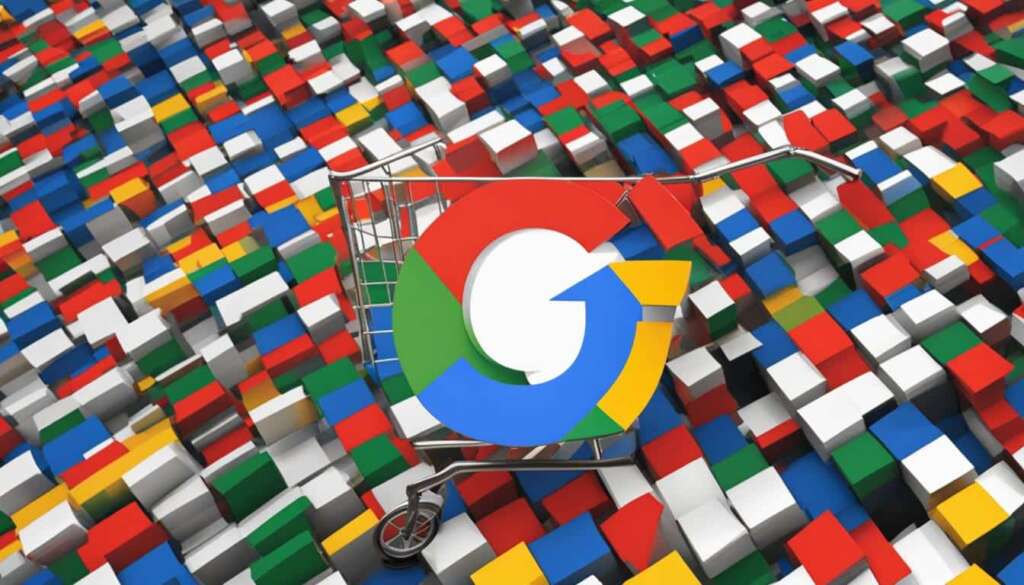Table of Contents
E-commerce marketing is an essential component of any successful online business. To drive online sales and increase customer engagement, businesses need to implement effective digital marketing strategies. By leveraging the power of e-commerce and utilizing various marketing tactics, companies can attract, convert, and retain customers in the competitive online marketplace.
Whether you’re an established e-commerce brand or just starting out, it’s crucial to have a holistic approach to your digital marketing efforts. This article will explore some key strategies that can help you optimize your e-commerce website, improve your online presence, and drive conversions.
From search engine optimization (SEO) to social media marketing, we’ll delve into different aspects of e-commerce and digital marketing that can boost your online sales and customer engagement. By implementing these strategies, you can position your business for success in the digital landscape.
21 E-commerce Marketing Ideas to Increase Online Sales
Implementing various marketing tactics is crucial for increasing online sales. Here are 21 effective e-commerce marketing ideas that can help you drive more revenue and boost customer engagement:
- Invest in SEO: Optimize your website and product pages with relevant keywords to improve search engine rankings and drive organic traffic.
- Run influencer marketing campaigns: Collaborate with popular influencers in your industry to promote your products and reach a wider audience.
- Sell on marketplaces: Expand your reach by selling your products on popular e-commerce marketplaces like Amazon, eBay, and Etsy.
- Create a TikTok marketing strategy: Tap into the potential of TikTok to showcase your products and connect with a younger audience through engaging videos.
- Run PPC campaigns: Launch targeted pay-per-click advertising campaigns on platforms like Google Ads and Facebook Ads to drive traffic and conversions.
- Upsell your products: Offer additional products or upgrades to customers during the checkout process to increase their average order value.
- Integrate Instagram: Leverage the visual appeal of Instagram by integrating your product catalog and enabling shopping features on your profile.
- Reduce abandoned carts: Implement strategies like cart abandonment emails and retargeting ads to recapture potential customers who left without making a purchase.
- Send text message campaigns: Use SMS marketing to send promotional messages, offers, and updates directly to your customers’ mobile phones.
- Capture more email subscribers: Offer valuable incentives like discounts or exclusive content in exchange for email sign-ups to grow your email marketing list.
- Improve email campaigns: Personalize your email marketing campaigns, create compelling content, and optimize your email design to increase open rates and click-through rates.
- Make it easy for customers to find what they want: Simplify your website navigation, provide detailed product descriptions, and enable powerful search functionality.
- Engage with online store visitors through live chat: Offer real-time assistance and support to your website visitors to enhance their shopping experience and address their concerns.
- Anticipate future sales: Use data from previous customer purchases and browsing history to make personalized product recommendations and anticipate future needs.
- Start a content marketing program: Create informative and engaging blog posts, videos, and guides that provide value to your target audience.
- Embrace personalization: Use customer data to deliver personalized recommendations, product suggestions, and tailored marketing messages.
- Leverage user-generated content: Encourage your customers to share their experiences and reviews, and showcase user-generated content on your website and social media channels.
- Think local: Implement local SEO strategies to target customers in specific geographic areas, and participate in local events and partnerships.
- Optimize product pages: Ensure your product pages are informative, visually appealing, and optimized for search engines with relevant keywords and meta tags.
- Optimize for mobile: Ensure your website is mobile-friendly and provides a seamless shopping experience on smartphones and tablets.
- Reward loyal customers: Implement a loyalty program with exclusive perks, discounts, and rewards to encourage repeat purchases and foster customer loyalty.
Implementing these e-commerce marketing ideas can help you increase online sales, drive customer engagement, and encourage repeat purchases. By combining various tactics and continuously monitoring and optimizing your marketing efforts, you can maximize your e-commerce success.
| E-commerce Marketing Ideas | Benefits |
|---|---|
| Invest in SEO | Improve search engine visibility and drive organic traffic. |
| Run influencer marketing campaigns | Reach a wider audience and build brand credibility. |
| Sell on marketplaces | Expand your customer reach and tap into established customer bases. |
| Create a TikTok marketing strategy | Connect with a younger audience and drive engagement through engaging videos. |
| Run PPC campaigns | Drive targeted traffic to your website and increase conversions. |
| Upsell your products | Increase average order value and maximize revenue per customer. |
| Integrate Instagram | Showcase your products visually and enable seamless shopping experiences. |
| Reduce abandoned carts | Recover lost sales by engaging with potential customers who left without completing a purchase. |
| Send text message campaigns | Stay connected with your customers and drive immediate actions through SMS marketing. |
| Capture more email subscribers | Grow your email list and nurture customer relationships through email marketing. |
Continued in Section 3.
The Power of Content Marketing in E-commerce
Content marketing is a powerful strategy for driving traffic and increasing engagement on an e-commerce website. By creating high-quality and engaging content, you can attract and retain customers, ultimately boosting your online sales. Implementing effective content marketing tactics can make a significant difference in the success of your e-commerce business.
One important aspect of content marketing in e-commerce is optimizing product pages. By including relevant keywords and creating informative descriptions, you can improve the discoverability of your products and enhance the customer experience. When potential customers search for specific products or solutions, optimized product pages increase the likelihood of your e-commerce website appearing in search engine results.
In addition to optimizing product pages, writing relevant blog posts can also drive traffic to your e-commerce store. By providing valuable and informative content related to your products or industry, you can attract potential customers who are seeking information or solutions. This establishes your authority and positions your brand as a trusted source, increasing the likelihood of conversions and repeat purchases.
Another effective content marketing strategy is guest posting on external websites. By collaborating with industry influencers or reputable blogs, you can reach a wider audience and tap into their existing readership. This not only generates more visibility for your e-commerce store but also builds credibility and trust with potential customers.
Create Valuable Content and Attract More Visitors
When creating content for your e-commerce website, it’s important to address the pain points and common questions of your target audience. By providing valuable answers and solutions, you position your brand as an authority and establish trust with potential customers.
An effective way to attract more visitors to your e-commerce website is by including a keyword-driven FAQ section. This not only improves search engine rankings but also helps potential customers find the information they need quickly and easily. By addressing common questions and concerns, you can alleviate any doubts they may have and increase the likelihood of conversions.
In conclusion, content marketing is a powerful tool for promoting an e-commerce website. By optimizing product pages, writing relevant blog posts, and leveraging guest posting opportunities, you can attract more visitors, increase engagement, and ultimately boost your online sales. Investing in content marketing is a long-term strategy that provides valuable returns, establishing your brand as a trusted resource in your industry.
Social Media Marketing for E-commerce
Social media marketing is a powerful tool for promoting e-commerce businesses. With platforms like Instagram, businesses can showcase visually appealing content to reach a wider audience. This can be done by leveraging the power of visual content, such as eye-catching images and videos that capture users’ attention as they scroll through their feeds.
Using Instagram for Visual Content
Instagram, with its focus on visual storytelling, is particularly effective for e-commerce brands. By sharing engaging visual content related to your products and brand, you can create a compelling narrative that resonates with your target audience. Instagram’s highly visual nature allows you to showcase your products in creative ways, helping you stand out from the competition.
Visual content on Instagram can take various forms, including product images, lifestyle shots, behind-the-scenes glimpses, and user-generated content. By featuring real people using your products, you can increase trust and authenticity, fostering a sense of community with your followers.
Promoting User-Generated Content and Product Reviews
One effective way to build trust and increase engagement on social media is by promoting user-generated content and product reviews. Encourage your customers to share their experiences with your products by creating a branded hashtag and offering incentives for participation. By sharing user-generated content on your social media profiles, you can showcase your products from a customer’s perspective and demonstrate their real-life benefits.
Additionally, featuring product reviews on your social media platforms can greatly influence purchasing decisions. Potential customers are more likely to trust the opinions of fellow consumers, so highlighting positive reviews and testimonials can serve as powerful social proof.
Diversifying Your Social Media Presence
To maximize the impact of your social media marketing efforts, consider utilizing different platforms for different purposes. While Instagram may be perfect for showcasing visual content, platforms like Facebook, Twitter, and LinkedIn can be used to share blog posts, industry news, and company updates. Tailor your content to each platform’s unique characteristics and the expectations of your target audience.
Furthermore, social media engagement should not be limited to posting content. Actively engage with your followers by responding to comments, messages, and mentions. This will help foster a sense of community, encourage further engagement, and strengthen brand loyalty.
By utilizing social media marketing strategies effectively, e-commerce businesses can significantly increase their reach, engagement, and ultimately drive more sales. Remember to always monitor and analyze your efforts to refine your social media marketing strategy and align it with the evolving needs and preferences of your target audience.
Conclusion
Implementing effective e-commerce marketing strategies and digital marketing tactics is crucial for boosting online sales, increasing brand awareness, and driving customer loyalty. By investing in SEO, running influencer marketing campaigns, selling on marketplaces, utilizing social media marketing, and creating valuable content, businesses can enhance their online presence and engage with their target audience.
One of the key aspects of a successful e-commerce marketing strategy is search engine optimization (SEO). By optimizing website content with relevant keywords and improving the site’s structure, businesses can improve their organic search rankings and drive more traffic to their online store. Additionally, running influencer marketing campaigns can help reach a wider audience and generate trust and credibility.
Selling on marketplaces is another effective tactic to expand online sales. By leveraging established platforms like Amazon or eBay, businesses can tap into their existing customer base and benefit from their marketing efforts. Utilizing social media marketing is also crucial, as platforms like Instagram and Facebook have become essential for brand promotion, engagement, and product discovery.
Creating valuable content is key to building brand awareness and customer loyalty. By producing informative blog posts, product guides, and engaging videos, businesses can attract and retain customers, positioning themselves as industry experts. Continuous evaluation and adaptation of marketing efforts are essential to stay ahead of the competition and leverage the latest trends in e-commerce marketing.
FAQ
What is e-commerce marketing?
E-commerce marketing refers to the practice of using promotional tactics to drive traffic to your online store, convert that traffic into paying customers, and retain those customers post-purchase.
What are some effective e-commerce marketing ideas?
Some effective e-commerce marketing ideas include investing in SEO, running influencer marketing campaigns, selling on marketplaces, creating a TikTok marketing strategy, running PPC campaigns, upselling your products, integrating Instagram, reducing abandoned carts, sending text message campaigns, capturing more email subscribers, improving email campaigns, making it easy for customers to find what they want, engaging with online store visitors through live chat, anticipating future sales, starting a content marketing program, embracing personalization, leveraging user-generated content, thinking local, optimizing product pages, optimizing for mobile, and rewarding loyal customers.
How does content marketing play a role in promoting an e-commerce website?
Content marketing plays a crucial role in promoting an e-commerce website by creating high-quality and engaging content that can attract and retain customers. This includes optimizing product pages with relevant keywords and creating informative descriptions, writing relevant blog posts and guest posts on external websites to drive traffic, and including a keyword-driven FAQ section on your website to improve search engine rankings.
How can social media marketing be used to promote e-commerce businesses?
Social media marketing is a powerful tool for promoting e-commerce businesses. Platforms like Instagram allow you to showcase visually appealing content and reach a wider audience. Promoting user-generated content and product reviews on social media can also help build trust and increase engagement. Utilizing different social media platforms for different purposes can diversify your efforts and cater to the needs of your target audience.
Why are effective e-commerce and digital marketing strategies essential?
Implementing effective e-commerce and digital marketing strategies is essential for increasing online sales and engagement. By investing in SEO, running influencer marketing campaigns, selling on marketplaces, utilizing social media marketing, and creating valuable content, you can boost your brand’s visibility and drive customer loyalty. It is important to continuously evaluate and adapt your marketing efforts to stay up-to-date with the latest trends and techniques in e-commerce marketing.













